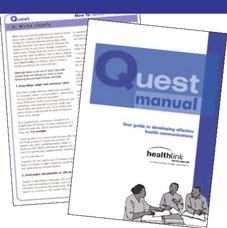|
| |
Quest

|

|
|
The Quest
training programme
|
|
This 'What is Quest? document in="quest.pdf" target="_blank"> pdf
format 496 kb pdf
format 496 kb
Q. What is Quest?
Quest is a framework to guide the process of planning, researching, developing, disseminating and evaluating communication and information resources. It has been developed in recognition of the need for practical and comprehensive guidelines on how to produce effective resources. Quest aims to enhance the quality and impact of resources produced, and to develop related organisational capacity. Relevant to a wide audience, it is adaptable for use in different contexts.
|

|
|
The Quest approach takes users through the process of resource development in a participatory and dynamic way. Rather than following instructions, participants actively engage with issues and questions that need to be considered at each stage. Quest develops capacity by facilitating constructive sharing and analysis of related experience, enhancing knowledge, developing necessary skills, and fostering reflective practice and learning.
A Quest training package helps to realise the organisational development potential of Quest. Within the framework of strengthening communication practice, the package will be negotiated with an organisation’s management. It will include an initial Quest workshop (ideally 5 days), support and follow-up activities. Led by communication experts, this package can be tailored to particular organisational needs and contexts.
The Quest supporting material includes:
-
The core manual, which outlines the resource development process in seven stages (see below).
-
Complementary How To guides – 20 short, practical skill guides that relate to steps in the process.
Key stages in the Quest framework
Stage 1 Assessing needs Why do you need a resource? Who is it for and what do you need to know
about them? What kind of resource is needed? What related materials already exist?
Stage 2 Planning What are you trying to achieve? What resources are available? Who is responsible for particular steps in the process? How will you ensure that your aims are met and that a quality resource is produced on time?
Stage 3 Researching content and design What background information do you need? How will you
formulate appropriate messages? What medium and design is most appropriate?
Stage 4 Developing content and design What content should the resource include? What particular messages need to be developed? How do you produce a draft?
Stage 5 Pre-testing How can you check that the resource will achieve its aim? How can you use
feedback constructively? How can you assure quality and value in the final product?
Stage 6 Production and dissemination How will you produce the resource? Who is responsible for what? What expertise do you need? How will you ensure effective dissemination and follow up?
Stage 7 Evaluation and learning How will you evaluate and demonstrate the short, medium and long- term impacts of the resource? What can you learn from the whole process?
|
Quotes from participants in a recent Quest workshop:
| "I learned well, I got new ideas and
skills and the important teaching
methods used motivated me to discuss, participate and analyse " |
"We work in health research and the Quest process is important to
use in planning and the process of achieving the aims of our work" |
|
updated: 23 April, 2014
|